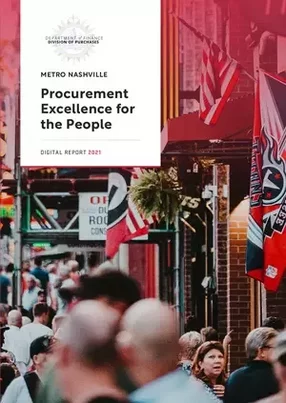Inside the office buildings of the Metropolitan Government of Nashville & Davidson sits the division of purchases. In many ways, it is the beating heart of the Tennessee capital’s government, tasked with the singular purpose of advising and equipping more than 50 agencies, from the Fire Department to the Arts Commission, with the goods and services they need to fulfill their duties.
The procurement division, as it is colloquially known, manages all purchases in excess of $25,000. Departments, empowered by Michelle Hernandez Lane, the Chief Procurement Officer, handle everything below that threshold. “Anything above that is going to come to our office,” she says.
Hernandez Lane was appointed to the role in 2017, but has served the Metro Nashville government in a variety of capacities for two decades, joining in 2001 developing small business initiatives, and more recently as its Chief Diversity Officer. Her unique perspective on the local community, and her grasp of government duty, places her at the centre of close to $900m worth of annual spend.
“Our goal is to assist the various departments in meeting their objectives by providing them with superior procurement services that are aligned with the administration priorities in a legal way. Many of those departments know what they need, but they don't always know all of the government procurement rules to get it. Our job is to provide them with those services.”
Hernandez Lane and her team touch nearly every major project, from the city’s streets and roads, to soccer stadiums and ballparks. As a result, she feels a great responsibility to represent the residents and communities of the Tennessee capital. “It is the people’s money that we spend,” she says. “So they should have some opportunity to participate in that process.” It is one of the biggest points of difference between Hernandez Lane’s procurement role and her private sector peers.
“There is such a stark difference between what you can do as a procurement officer in the private sector versus the public sector,” she says. "There are some who would say that the process in the public sector is not necessarily intuitive or common sense, but it is built the way that it is to ensure that there is integrity in that process, fairness, and that all potential offers have an opportunity.”
It is a system designed to rout out favoritism, but it can be limiting, Hernandez Lane admits. In her many years of experience working in government, such stringent regulation can hamper the light speed shifts in development upon which the corporate world is contingent. The challenge is in “maintaining the spirit of fairness, integrity, and transparency”, all while navigating the ultra-competitive world of procurement.
“When you take strategic sourcing more generally, you're thinking about what those supplier relationships look like and how you can establish them in a way that ensures you're able to secure the goods and services, at the quality that you need, and at the best price. But some of the elements of that strategic sourcing almost fly in the face of the more specific rules for government procurement.
“So we’re always looking at ways to rethink our approaches. Something that we'll be undertaking here in the next few months is looking at how we approach demonstrations and pilot projects, which appear to restrict your ability in procurement activity with whomever provided that pilot or demonstration. That is so counterintuitive to the way that sourcing working more broadly in the world, not just in the government sector.”
That ability to adapt and solve the vast number and high complexity of multi-departmental needs is powered by Metro Nashville’s early adoption of digitalization. Here, the procurement team has a head start on much of the private sector, large segments of which are still struggling to realize the potential of digital transformation. Metro Nashville’s entire procurement function operates electronically through the Oracle iProcurement system. All requests for proposals, competitive solicitation and other negotiation processes are handled digitally. As is contract management, purchase orders, and sign-off through digital signatures.
“I feel extraordinarily privileged that we operate in such a cutting-edge electronic procurement system, because from my discussions with peers and suppliers, many have struggled to successfully make this digital transformation,” Hernandez Lane says. “We had to adjust some of our internal business processes, which we've done very well, but from the standpoint of day-to-day work and the procurement process, it was largely digital already, and we were fully able to execute our functions in an efficient manner.”
This digital readiness mitigated much of the impact of the pandemic. When meeting physically was no longer an option, the team simply pivoted to a variety of digital platforms, such as WebEx and Zoom. In fact, these efficiencies will be carried forward at Metro Nashville. Still to define exactly what return-to-office work will look like, whether it’s full-time on-premises or a hybrid approach, Hernandez Lane intends to take the digital tools that have kept them operating throughout the crisis into the future.
“No one wants this efficiency at the cost of something as horrific as the pandemic,” she says. “But the silver lining for me is that we have learned how to use the tools and resources that we have available to us in a more effective way.”
One major advantage is a transformation of the bidding process. Where once prospective suppliers were invited in to pitch and bid on a contract, those meetings are now held digitally on WebEx. It shifts the balance in favor of organizations of all sizes, Hernandez Lane says, who adds that the smaller businesses are often the most technologically savvy.
“People can log in, hear all of the information that's there, ask questions, we have a record of their attendance. All of those things are beneficial to us because it increases competition and the likelihood that we receive the best product or service at the best price. That’s certainly a net gain for the government, and it benefits suppliers because more of them have an opportunity to engage with us.
“We position ourselves to make sure that our suppliers understand what we're seeking and how to do business with us. That was usually a session in person at 10am during the day, when many of these smaller businesses who don't have the privilege of a business development officer. They have to make a decision: do I go and learn something that could translate into more business opportunities with the city, or do I complete this project for an existing contract? Whereas now we have those sessions electronically, and it gives them the opportunity to be there, to ask questions, to learn, to understand without necessarily having to take away as much time.”
Beyond routine sourcing functions, Hernandez Lane’s team also acts as a response force. Vital to the government’s pandemic efforts, they are well versed in supporting departments during emergency situations; in the past year alone they’ve faced two tornadoes, and a bombing on Christmas morning.
“Our procurement regulations have very clear directions about how you manage the procurement process under emergency conditions. Our office is supportive of departments who do have some latitude to meet the need of the emergency. They're not going to stop repairing a water main break that was the result of an explosion downtown, for example, because they've got to go through the purchasing process. The procurement regulations provide a detailed process for them to meet the need of that emergency. And then we work to execute the administrative piece of it on the backend.”
As life begins to return to pre-pandemic normality, Hernandez Lane has great ambitions to realize the insights and learnings of the past 12 months. On going reform will continue at all points throughout the procurement process.
“I hope that this time next year we see a full exploitation of our efforts around procurement reform. There's still a lot of work to do, but I want that procurement process to be best in class. I want Metro Nashville to be that place in government procurement that folks look to and say, ‘They're really doing a really great job with digital procurement. They've got a really great approach to equity and inclusion in procurement, transparency, and processes where folks are able to service themselves and have insight into that process’. All of that to me builds a best in class organization that I know we can achieve.

- Michelle Hernandez Lane

